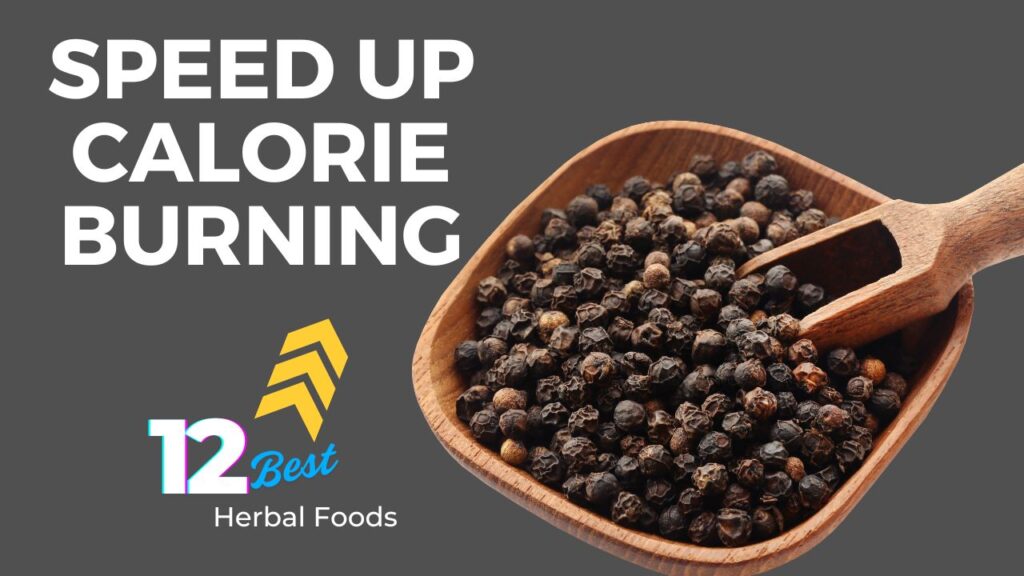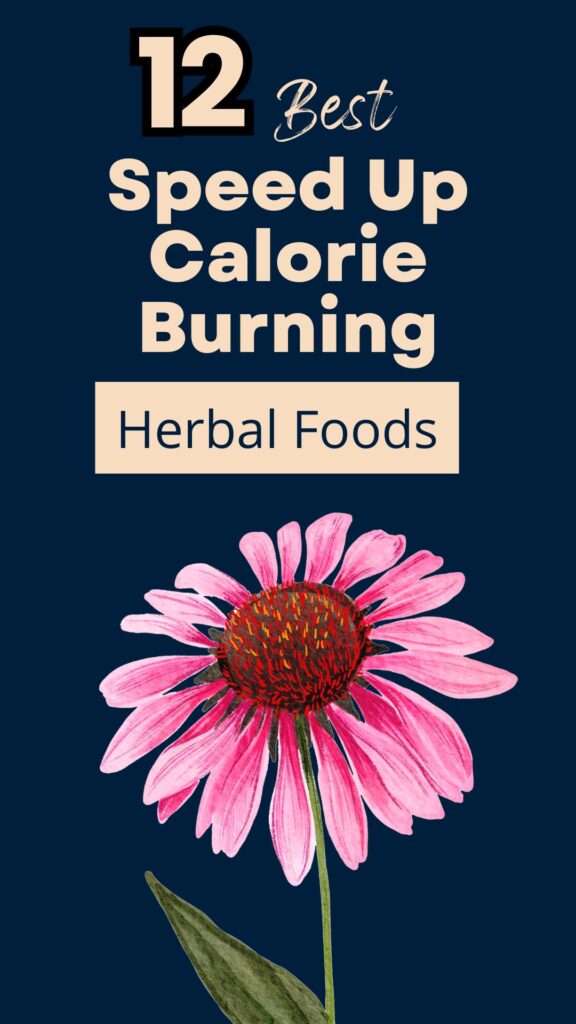Some links in this blog are affiliate links. If you make a purchase through these links, I may receive a small commission. This helps support the site at no extra cost to you.
Struggling to shed those extra pounds despite eating healthy? Did you know that certain herbal foods can naturally boost your metabolism and help your body burn calories more efficiently?
While exercise and diet are the backbone of weight management, some herbs contain compounds that ignite your calorie-burning potential.
In this post, we’re diving into 12 herbal foods that can enhance calorie burning. From teas that stimulate fat oxidation to spices that increase thermogenesis, you’ll discover not only how these herbs work but also how to use them effectively.
You’ll also learn who should be careful with them, how to store them, and simple ways to incorporate them into your diet.
Let’s explore the fascinating world of herbs that can support your metabolism and transform your meals.

Table of Contents

12 Herbal Foods To Eat
1. Green Tea
Best Ways to Eat or Use It
- Drink freshly brewed green tea 2–3 times a day.
- Use matcha powder in smoothies, oatmeal, or baked goods.
- Pair with a slice of lemon to enhance antioxidant absorption.
Tips to Maximize Nutrient Absorption
Green tea contains catechins, which boost metabolism. Drinking it on an empty stomach may increase calorie burn, but some people prefer it after meals to avoid stomach upset.
Who Should Eat / Avoid
- Good for: weight-loss seekers, athletes, anyone looking for a caffeine boost.
- Avoid/Limit if: pregnant women (due to caffeine), people sensitive to caffeine, or those with acid reflux.
Storage & Buying Tips
- Buy loose leaf or high-quality matcha.
- Store in a cool, dry place away from sunlight.
- Avoid tea bags with artificial flavoring for maximum potency.
Do’s & Don’ts
| ✅ Do | ❌ Don’t |
|---|---|
| Drink fresh, not over-steeped | Add too much sugar |
| Pair with lemon for antioxidants | Reuse tea leaves multiple times |
Possible Side Effects
Excess green tea can cause insomnia, jitteriness, or stomach upset due to caffeine content.
2. Cayenne Pepper
Best Ways to Eat or Use It
- Add to soups, stews, and stir-fries.
- Sprinkle on roasted vegetables or eggs.
- Use in salad dressings for a spicy kick.
Tips to Maximize Nutrient Absorption
Capsaicin is the active compound that increases calorie burning. Pairing with fats, like olive oil, can help absorption.
Who Should Eat / Avoid
- Good for: people aiming for weight loss, athletes, or those who enjoy spicy foods.
- Avoid/Limit if: prone to heartburn, gastritis, or ulcers.
Storage & Buying Tips
- Store in an airtight container in a dark place.
- Choose dried whole peppers for longer shelf life; grind as needed.
Do’s & Don’ts
| ✅ Do | ❌ Don’t |
|---|---|
| Start with small amounts and increase gradually | Overuse in one meal |
| Mix with healthy fats for absorption | Consume before bed if sensitive |
Possible Side Effects
Too much cayenne can cause digestive discomfort or a burning sensation in the stomach.
3. Ginger
Best Ways to Eat or Use It
- Add fresh ginger to teas, smoothies, or stir-fries.
- Use ginger powder in baked goods or curries.
- Drink ginger water for a morning metabolism boost.
Tips to Maximize Nutrient Absorption
Combine ginger with lemon or honey to soothe the stomach while enhancing digestion.
Who Should Eat / Avoid
- Good for: people with digestion issues, cold-prone individuals, or weight-loss seekers.
- Avoid/Limit if: prone to blood clotting issues or taking certain medications like blood thinners.
Storage & Buying Tips
- Store fresh ginger in the fridge or freeze for longer shelf life.
- Choose firm, smooth roots without wrinkles.
Do’s & Don’ts
| ✅ Do | ❌ Don’t |
|---|---|
| Use fresh for maximum benefits | Overcook and lose potency |
| Add to meals or teas | Rely solely on ginger for weight loss |
Possible Side Effects
High doses may cause heartburn or mouth irritation.
4. Turmeric
Best Ways to Eat or Use It
- Mix turmeric with milk or water to make golden milk.
- Add to curries, soups, and rice dishes.
- Blend into smoothies with black pepper to enhance absorption.
Tips to Maximize Nutrient Absorption
Curcumin is better absorbed with fats and black pepper.
Who Should Eat / Avoid
- Good for: anti-inflammatory benefits, weight management, athletes.
- Avoid/Limit if: gallbladder problems or blood-thinning medications.
Storage & Buying Tips
- Keep turmeric in a sealed, dark container.
- Prefer fresh roots for higher antioxidant content; powder works well too.
Do’s & Don’ts
| ✅ Do | ❌ Don’t |
|---|---|
| Pair with black pepper and healthy fats | Use old, clumpy powder |
| Incorporate daily in small amounts | Rely on supplements only |
Possible Side Effects
Large doses can cause stomach upset or interact with certain medications.
5. Cinnamon
Best Ways to Eat or Use It
- Sprinkle on oatmeal, yogurt, or smoothies.
- Add to baked goods or coffee.
- Make a cinnamon tea for a metabolism boost.
Tips to Maximize Nutrient Absorption
Cinnamon may help regulate blood sugar, enhancing calorie utilization. Pair with fiber-rich foods to control glucose spikes.
Who Should Eat / Avoid
- Good for: people with type 2 diabetes, weight-loss seekers, and those with low energy.
- Avoid/Limit if: allergic to cinnamon or pregnant in high amounts.
Storage & Buying Tips
- Store in an airtight container in a cool, dark place.
- Prefer Ceylon cinnamon over Cassia for lower coumarin content.
Do’s & Don’ts
| ✅ Do | ❌ Don’t |
|---|---|
| Add to meals for flavor and metabolism | Overconsume in one sitting |
| Use Ceylon for regular consumption | Rely solely for weight loss |
Possible Side Effects
High doses may cause liver toxicity in sensitive individuals.
6. Black Pepper
Best Ways to Eat or Use It
- Add to savory dishes, soups, and salads.
- Mix with turmeric for anti-inflammatory benefits.
- Use freshly ground for maximum potency.
Tips to Maximize Nutrient Absorption
Piperine in black pepper enhances nutrient absorption, especially fat-soluble vitamins like A, D, and E.
Who Should Eat / Avoid
- Good for: weight management, digestion, and nutrient absorption.
- Avoid/Limit if: prone to heartburn or ulcers.
Storage & Buying Tips
- Store whole peppercorns in a dark, dry place; grind as needed.
- Avoid pre-ground pepper for long-term use, as it loses potency quickly.
Do’s & Don’ts
| ✅ Do | ❌ Don’t |
|---|---|
| Combine with turmeric and healthy fats | Overuse if sensitive to spice |
| Use freshly ground for best results | Store in humid places |
Possible Side Effects
Too much may irritate the stomach lining.
7. Garlic
Best Ways to Eat or Use It
- Add raw garlic to salads and dressings for maximum potency.
- Cook in soups, stir-fries, or sauces.
- Use garlic powder in seasoning blends.
Tips to Maximize Nutrient Absorption
Allicin is most potent when garlic is crushed and left to rest for 10 minutes before cooking.
Who Should Eat / Avoid
- Good for: cardiovascular health, boosting metabolism, and immune support.
- Avoid/Limit if: taking blood-thinning medications or prone to digestive upset.
Storage & Buying Tips
- Store in a cool, dry place; avoid refrigeration if bulbs are whole.
- Buy firm, plump bulbs without sprouts.
Do’s & Don’ts
| ✅ Do | ❌ Don’t |
|---|---|
| Crush and rest before cooking | Overcook for long periods |
| Add raw to foods for potency | Rely solely on garlic supplements |
Possible Side Effects
Can cause bad breath, stomach upset, or allergic reactions in sensitive individuals.
8. Ginseng
Best Ways to Eat or Use It
- Brew as tea or add to soups.
- Use ginseng powder in smoothies or energy drinks.
- Take standardized supplements if recommended by a professional.
Tips to Maximize Nutrient Absorption
Avoid pairing with alcohol, which may reduce effectiveness.
Who Should Eat / Avoid
- Good for: energy boost, mental alertness, and metabolism enhancement.
- Avoid/Limit if: high blood pressure, heart conditions, or pregnant/nursing.
Storage & Buying Tips
- Store dried ginseng in a cool, dry place.
- Buy from reputable sources for authenticity.
Do’s & Don’ts
| ✅ Do | ❌ Don’t |
|---|---|
| Brew gently to preserve nutrients | Overconsume in one sitting |
| Follow recommended dosages | Mix with alcohol |
Possible Side Effects
Can cause insomnia, headaches, or elevated heart rate in some individuals.
9. Oregano
Best Ways to Eat or Use It
- Sprinkle on salads, pizzas, and roasted vegetables.
- Brew as herbal tea.
- Mix into sauces or marinades.
Tips to Maximize Nutrient Absorption
Contains antioxidants and can enhance digestion when combined with healthy fats.
Who Should Eat / Avoid
- Good for: digestion, metabolic support, and immune health.
- Avoid/Limit if: allergic to Lamiaceae family herbs.
Storage & Buying Tips
- Store dried oregano in an airtight container away from sunlight.
- Use fresh leaves for stronger flavor in dishes.
Do’s & Don’ts
| ✅ Do | ❌ Don’t |
|---|---|
| Use in cooking and teas | Store in humid environments |
| Pair with olive oil | Rely solely on oregano for weight loss |
Possible Side Effects
Rare, but may cause allergies in sensitive individuals.
10. Rosemary
Best Ways to Eat or Use It
- Use fresh or dried in roasted dishes, soups, and marinades.
- Brew as tea for metabolism and digestion support.
- Add to infused oils for cooking.
Tips to Maximize Nutrient Absorption
Combining with fats improves antioxidant absorption.
Who Should Eat / Avoid
- Good for: digestion, memory, and calorie burning.
- Avoid/Limit if: pregnant (high amounts) or sensitive to herbs.
Storage & Buying Tips
- Store fresh in the fridge or dried in airtight containers.
- Choose vibrant, aromatic leaves for best potency.
Do’s & Don’ts
| ✅ Do | ❌ Don’ t |
|---|---|
| Add to dishes early in cooking | Use old, faded leaves |
| Brew tea in moderation | Rely solely on rosemary for weight loss |
Possible Side Effects
High doses may cause digestive upset or allergic reactions.
11. Thyme
Best Ways to Eat or Use It
- Sprinkle on meats, vegetables, and soups.
- Brew as herbal tea.
- Add to roasted or grilled dishes.
Tips to Maximize Nutrient Absorption
Thyme’s antioxidants are better absorbed when paired with fats.
Who Should Eat / Avoid
- Good for: digestion, immunity, and metabolism support.
- Avoid/Limit if: allergic to Lamiaceae family herbs.
Storage & Buying Tips
- Store dried thyme in airtight containers.
- Fresh thyme can be stored in the fridge for 1–2 weeks.
Do’s & Don’ts
| ✅ Do | ❌ Don’t |
|---|---|
| Use in meals or teas | Overcook for long periods |
| Combine with healthy fats | Store in light or humid places |
Possible Side Effects
Rare allergic reactions or mild digestive issues.
12. Mint
Best Ways to Eat or Use It
- Add fresh leaves to teas, salads, and smoothies.
- Use as a garnish for desserts or beverages.
- Blend into sauces or dips.
Tips to Maximize Nutrient Absorption
Mint improves digestion and may increase metabolic rate slightly.
Who Should Eat / Avoid
- Good for: digestion, weight management, and fresh breath.
- Avoid/Limit if: sensitive to menthol or prone to acid reflux.
Storage & Buying Tips
- Store fresh mint in water in the fridge.
- Freeze leaves in ice cube trays for long-term use.
Do’s & Don’ts
| ✅ Do | ❌ Don’t |
|---|---|
| Use fresh or frozen for best flavor | Store in airtight containers without moisture |
| Add to drinks and meals | Overcook and reduce potency |
Possible Side Effects
Excessive consumption may trigger heartburn or allergic reactions in sensitive individuals.
Conclusion
These 12 herbal foods are powerful allies in boosting your metabolism, enhancing calorie burning, and adding flavor and nutrition to your meals.
From the fiery heat of cayenne to the soothing zing of ginger, incorporating these herbs into your daily diet can help you achieve your weight goals naturally.
Start small, experiment with flavors, and see which herbs resonate with your taste and lifestyle. Your next meal could be a metabolism-boosting powerhouse simply by adding one or more of these herbs.
Share your favorite recipe with these herbal foods in the comments and inspire others to eat healthy while boosting calorie burn!
Frequently Asked Questions (FAQs)
Can herbal foods alone help me lose weight?
Herbal foods can support metabolism and calorie burning, but they are most effective when combined with a balanced diet and regular exercise.
How much green tea should I drink daily for metabolism benefits?
Drinking 2–3 cups of green tea per day is generally safe and effective for boosting metabolism, but avoid excessive consumption due to caffeine.
Are cayenne pepper and spicy foods safe for everyone?
Spicy foods like cayenne can boost calorie burn, but people with acid reflux, gastritis, or ulcers should limit consumption.
Can pregnant women consume these herbal foods?
Some herbs, like green tea (due to caffeine) and high doses of ginseng or rosemary, may not be safe during pregnancy. Always consult your doctor.
Do I need to take supplements for these herbs to work?
No. Fresh or dried herbs incorporated into your meals are usually sufficient. Supplements may help in certain cases but are not mandatory.
How should I store these herbs to maintain potency?
Store dried herbs in airtight containers away from light and moisture. Fresh herbs should be refrigerated or frozen for longer shelf life.
Can these herbs cause side effects?
Yes. Some herbs may cause digestive upset, allergic reactions, or interact with medications. Use in moderation and consult a doctor if needed.
How quickly can I see results with these herbal foods?
Results vary depending on diet, exercise, and metabolism. Herbs support calorie burning gradually—they are not a quick fix.
Can I mix these herbs together?
Yes, many herbs complement each other in teas, smoothies, or meals. For example, turmeric and black pepper or ginger and lemon.
Are there any herbs that should be avoided together?
Avoid combining multiple stimulants like high doses of ginseng and green tea in one meal if you are sensitive to caffeine or have heart issues.










